Learning and knowledge sharing are fundamental to the LHSS Project. We invite you to search LHSS knowledge products and resources for the latest approaches, insights, and learning in the field of integrated health systems strengthening.
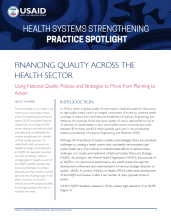
This brief builds on the USAID Local Health System Sustainability Project (LHSS) Strengthening Governance report (2022) and global National Quality Policy and Strategy (NQPS) survey, aiming to provide practical examples and considerations for country practitioners to consider on their quality journeys. It includes case studies of three countries that have used NQPS to mobilize and align resources for quality.
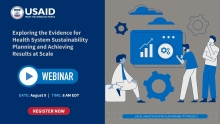
In this webinar, we discuss conditions that facilitate the institutionalization of practices that improve health system outcomes.
This learning brief can be used as a resource for HRH managers, planners, program managers, and frontline practitioners to learn how other countries are approaching and successfully designing and implementing solutions to their HRH challenges. It can also be used as a reference for health policy makers, funders, and implementing partners to inform the design and implementation of HRH resource optimization initiatives covered in this brief.
This two-pager focuses on USAID’s Learning Question 1, “What are the contributions of systems thinking approaches and tools to changes in health system outcomes? How do systems thinking approaches affect health system outcomes?”
This Catalog allows practitioners to consider which interventions have more robust evidence bases to support their practical application, such as: enhancing worker and supervisor competencies through training, offering nonfinancial incentives for high performers, practicing task sharing to promote cost savings, implementing digital solutions to expand access to services, and reducing costs of procuring and distributing pharmaceutical products.
This two-pager focuses on USAID’s Learning Question 5, “What are effective and sustainable mechanisms or processes that enable the participation of private sector, civil society, and public organizations in developing locally-led solutions to improve high-performing health care, especially for poor and vulnerable populations? What enables the effective participation or leadership of marginalized populations themselves in the development and implementation of these solutions? Under what conditions is this participation different?”
This Year 4 Quarter 2 Report (Jan-Mar 2023) was prepared for USAID and provides a progress update for all annual work plan activities.
This primer is designed to help supply chain practitioners in governments, the private sector, donor agencies, and implementing partners understand the value of political economy analysis (PEA) and how it can help improve outcomes when implementing supply chain interventions and reforms.
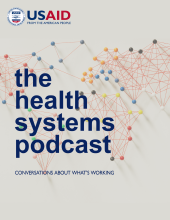
Three LHSS experts discuss what a resilient health system looks like, and how countries can shift from reacting to health emergencies to building in preparedness.
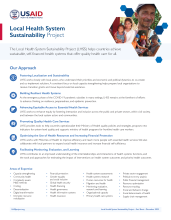
The Local Health System Sustainability Project (LHSS) helps countries achieve sustainable, self-financed health systems that offer quality health care for all. This fact sheet summarizes our approach and technical areas of expertise.

Join us to learn how thinking and working politically and using political economy analysis or PEA can strengthen efforts to reform health commodity supply chains.
To advance progress toward universal health coverage, agreed-upon health priorities need to be reflected in national plans and budgets. This blog offers key lessons for ministries of health seeking to make that happen.
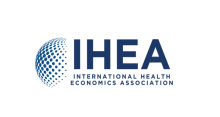
The 15th IHEA World Congress on Health Economics will be held at the Cape Town International Convention Centre from July 8-12, 2023
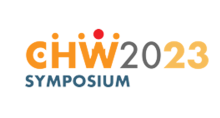
Join LHSS at the 3rd International Community Health Workforce Symposium, March 20-24, 2023, in Monrovia, Liberia.
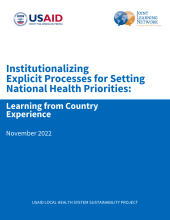
This learning resource presents key learning from the activity literature review, learning exchange meetings, and TA workshops. This resource focuses particularly on stakeholder engagement and institutionalizing stronger links between national health priorities, sector plans and national budgets, which learning partners identified as their most pressing issues.
